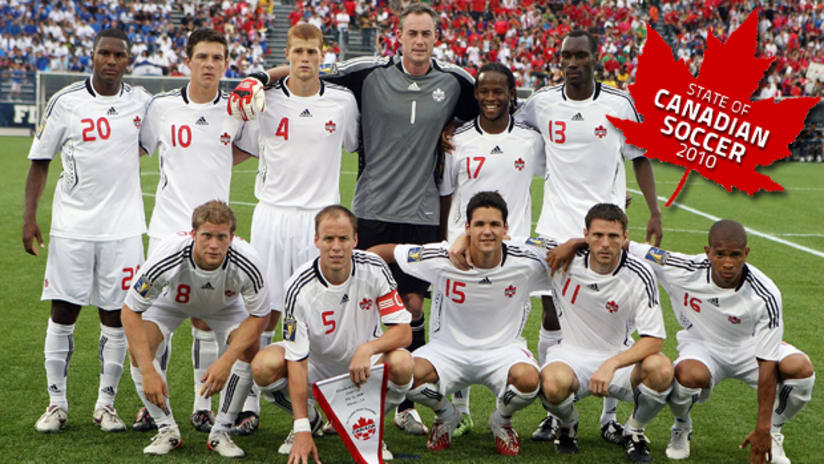Ahead of the league welcoming its second Canadian franchise, the Vancouver Whitecaps, into the fold, MLSsoccer.com has explored the state of Canadian soccer — where it's been, where it's at and where it's going. Here, Toronto FC beat writer Duane Rollins looks at Canada's recent struggles at the national team level and presents some ideas for moving the program forward.
The past 10 years have been wholly forgettable for the Canadian national team, and there are fears things won't improve anytime soon. However, a grassroots movement has sprung hope that a new generation of quality players will return Canada to the world stage.
Just a decade ago, though, it seemed Canadian soccer as a whole was on an upward trajectory.
[inlinenode:323331]In 2000, Canada had just defeated Colombia to win the Gold Cup. The winning team consisted of players old enough to have witnessed their national team participate in the 1986 World Cup. Most were either playing their club soccer in MLS or throughout some of Europe's top leagues.
It truly seemed as though Canada’s time was coming, and a trip back to the promised land — the World Cup — was inevitable.
But then it all went sideways.
A disastrous 2002 qualifying campaign was followed by an even more tepid run toward Germany 2006. After a brief glimmer of hope at the 2007 Gold Cup – Canadians still see Atiba Hutchinson’s disallowed goal in the semifinal against the US – it bottomed out during an unsuccessful qualifying campaign for South Africa.
The Canucks earned just two points out of 18 in the semifinal stage, which included a humiliating loss to Honduras in Montreal at a stadium in which fans of los Catrachos far outnumbered fans of Canada.
Canada’s lost decade ended with a whimper. What started with hope ended in despair.
Jason deVos was the captain of the 2000 Gold Cup-winning team. Now a color commentator for Toronto FC games on CBC and a passionate advocate for Canadian soccer, deVos said he would rather report that Canadian soccer has improved over the past decade. He just doesn't see much evidence that that’s the case.
“I have to defer to my older colleagues that have been involved in the game longer than me,” deVos said. “They tell me that things have never been worse.”
[inlinenode:325307]DeVos said the root of the problems are the same they have always been, that governance of the Canadian game has long been defined by regional disputes and a resistance to the changes for which deVos, and others, have long called.
According to deVos, the problem is that provincial associations — who are primarily responsible for overseeing youth recreational soccer — are seemingly more interested in advancing their local interests, whether these interests are in line with what’s best for the rest of the country or not. Instead, deVos believes the Canadian Soccer Association should be dictating centralized development programs and establishing a common pathway from youth to elite soccer.
At a recent AGM meeting, a plan to reform the CSA governance model was met with a resistance although delegates did agree to study the issue further. Besides, CSA general secretary Peter Montopoli said progress is being made to make the organization more effective.
“What we all want is for this organization to move forward in a professional fashion,” Montopoli said. "It’s not a matter of (one style of governance over another) but rather having the best people in place to make the best decisions that are best for the game."
“I see significant progress," he added.
Grassroots and homegrown talent
There is a new generation of Canadian soccer advocates who are challenging the status quo by directly investing in the game.
Dino Rossi of Mississauga, Ontario, is doing just that. Along with two partners, Rossi founded the semi-pro club Milltown FC last year.
Playing in the Canadian Soccer League, which is considered the third tier of the Canadian soccer pyramid, the team proved to be one of the best stories in Canadian soccer in 2010 and was in contention for a championship until the final week of the season.
Most importantly, though, the club succeeded in a way that is novel for Canadian soccer: It has focused on developing young players and on building bridges between the club at the local community it plays in.
[inline_node:325306]“There are a lot of dedicated people that understand what needs to be done,” Rossi said.
He points to changes in the MLS academy rules, which give clubs more opportunities and incentives to sign "homegrown" players, and the success of the Vancouver Whitecaps program, which has long produced quality players through its residency program.
In the Canadian Soccer League, about half the clubs are moving toward a development model and away from a more traditional North American franchise model. Rossi said that if Canada is to advance in the sport, that change is absolutely needed.
“Being inside the game I have a better understanding of the resistance to change – change can be scary," he said. "But I say to those that are resistant that it works everywhere else in the world it stands to reason that it will work here.
“We need to stop relying on other countries and the NCAA to develop our players. We need to stand on our own.”













